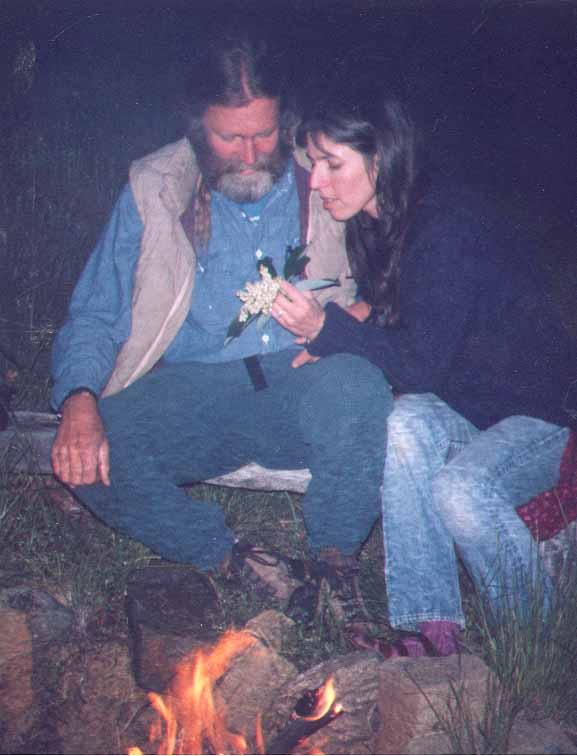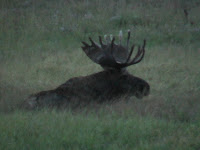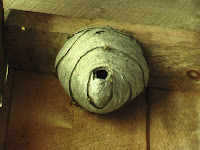Steve Spence, of
Green Trust in upstate New York, was kind enough to allow us to drop in on short notice. We were attracted to the hands-on, technical nature of the Green Trust operation which specializes in alternative power.
We parked on their land and stayed for almost two weeks. Steve's house is off-grid, and uses mostly solar panels for power. They are getting a motor set up to generate supplemental electricity and which will run on vegetable oil, but presently they run a gasoline generator when their solar battery bank gets low. It was here that I decided to fit a solar panel on my trailer as its limitations for dry camping had become obvious. Let me explain.
"Dry camping" is the term for parking a trailer somewhere that has no electrical or water utilities. An RV is designed to run on its 12 volt battery by default, but only certain things work in 12 volt mode. Big appliances, like the air conditioner, simply don't work. When we pulled into Green Trust,
nothing worked in 12 volt mode, and Steve helped us troubleshoot. First, we replaced the old coach battery with a marine battery. Then, two blown fuses later we had lights. For several days we had been trying to function inside with flashlights. What an uplifting psychological effect simple lights at night can make!
But there is no way to charge the coach battery other than by plugging the trailer into a 120 volt outlet, so one can't dry camp for long before the battery dies. Enter the solar panel, which should be standard on any RV, in my opinion. A solar panel keeps the battery charged anytime the sun hits the panel, including when one is driving down the road.

The solution I opted for was the simplest possible design, a solar panel, and a charge controller, hooked to the battery (plus the wire, some attaching hardware, and a used tube of sikaflex.) The whole setup cost $504. I actually waited until I got to Vermont to purchase this stuff as there is a
local store one can walk into and talk to someone, a rare commodity as most solar panels are being purchased over the internet. I'll spare you the details of running the wiring through the inside of a tiny trailer which was a pain in the behind--the charge controller is inside a cabinet--but now it's done.
WoodhengeOne afternoon we drove down to a nearby community called "
Woodhenge" and got a tour by a nice fellow named Phil.

The main house at Woodhenge is heated by a blast furnace that heats a huge column of sand that runs through the center of the round, 2 story house. Feed the furnace in the morning to heat the sand, and coast on the residuals for the rest of the day. Here is a picture of the top of the house where the column and the roof meet. But the house stays cool in the summer too. When we walked in it felt like the place was air conditioned. Thanks for the tour, Phil.
Mennonite NeighborsGreen Trust is active in the local community and will advise local folk on alternative power in exchange for barter items, like a baby pig or two. One evening a couple of the local Mennonite farmers came by and gave me a tour of their diesel VW jetta which runs on vegetable oil. These Mennonite and Amish farmers are way ahead of most of us when it comes to living independently, as they've been doing it for centuries. Growing crops, animal husbandry, welding, mechanics, governance, they know it all.
I had a very interesting conversation with one of these fellows, Melvin, on religion. Turns out his family is
former Mennonite as his father had developed doctrinal differences with the church. Specifically, this man thought growing and using tobacco was not Christian. Also, he felt the Bible teaches that to take Jesus into one's heart is the path to heaven and it bothered him at funerals when they would say "we
hope Brother Jeb goes to heaven". The picture that emerges is that Melvin's father is a man of deep, thoughtful morality and a brave leader, but for his outspoken nature he was asked to leave the Mennonite church.
"Just as well", said Melvin. When I asked why, he said "Why should I have to wear a black coat and hat to church? Why should anyone tell me what to wear? Is it anyone's business what I wear?" And I agree with you on that, Brother Melvin. Sounds like you are cut from the same cloth as your father.
We cross the Canadian borderOn Saturday, July 21 we went with the Spence family to Upper Canada Village, a 19th century town featuring traditional solutions to life's demands before electricity and gasoline. Here are Linda and Matthew in front of the old grain mill.

What a fun trip
that was.

Just for fun I've included a picture of this snake I caught one day.

And here is a picture of Rascal, who constantly hung out by our trailer begging us to play catch.
Thanks for having us, Green Trust!
 There's a lot to do to put a homestead ready for winter. Trillium has lots of fruit trees that were planted years ago so they are mostly heirloom varieties. Here we are picking apples. We've been enjoying applesauce and apple pies, yummy!
There's a lot to do to put a homestead ready for winter. Trillium has lots of fruit trees that were planted years ago so they are mostly heirloom varieties. Here we are picking apples. We've been enjoying applesauce and apple pies, yummy! But in the autumn the leaves take over and they must be raked up for compost. See that little speck of color to the right? That's Janet raking away. Go Janet! When we're finished I'll post a picture of the huge pile we are creating.
But in the autumn the leaves take over and they must be raked up for compost. See that little speck of color to the right? That's Janet raking away. Go Janet! When we're finished I'll post a picture of the huge pile we are creating. This was a scene Connor captured at the top of a "knob" above us, looking down the Little Applegate Valley. I asked my friend Chant to explain the word, "knob", which is an intermediate high spot on a ridge on the way to a still higher one. Chant is fascinating to listen to because he has such a vast and precise vocabulary. He says things like "knob", and "draw", and "fine-fuel", and "underburn" and I'm always slowing him down to explain them to me.
This was a scene Connor captured at the top of a "knob" above us, looking down the Little Applegate Valley. I asked my friend Chant to explain the word, "knob", which is an intermediate high spot on a ridge on the way to a still higher one. Chant is fascinating to listen to because he has such a vast and precise vocabulary. He says things like "knob", and "draw", and "fine-fuel", and "underburn" and I'm always slowing him down to explain them to me.













































